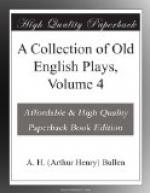Zygne ("Untill the zygne be gone below the hart”)
FOOTNOTES:
[1] “The tragedy of Sir John Van Olden Barnavelt. Herdrukt naar de Vitgrave van A.H. Bullen, met een Inleidung van R. Fruin. ’sGravenhage, Martinus Nijhoff, 1884,” 8vo., pp. xxxiii. 95.
[2] I fondly hoped that vol. iii. was immaculate; but on p. 21, last line, I find that spring has been misprinted soring. On p. 290, l. 3, sewe is a misprint for serve.
[3] It is curious that the next entry refers to a piece by Chettle called “The Orphanes Tragedy,” a title which at once reminds us of the second plot of Yarington’s play.
[4] The actor who took the part of Truth is to be in readiness to enter: he comes forward presently. In plays printed from play-house copies, stage-directions are frequently given in advance.
[5] Timeless in the sense of untimely occurs in Marlowe, &c.
[6] Old ed. “attended.”
[7] The old form of guests.
[8] The word fairing (i.e. a present brought home from a fair) is explained by the fact that Beech was murdered on Bartholomew eve ("Tis Friday night besides and Bartholomew eve"). Bartholomew Fair was held the next day.
[9] A famous tavern in Thames Street.
[10] Proposal.
[11] Nares supposed that the expression fear no colours was “probably at first a military expression, to fear no enemy. So Shakespeare derives it [Twelfth Night, i. 5], and, though the passage is comic, it is likely to be right.”
[12] “Here on” = hear one.
[13] i.e. what are you doing here so late?
[14] Old ed. “gentleman.”
[15] Old ed. “ends.”
[16] Mr. Rendle in his interesting account of the Bankside and the Globe Playhouse (appended to Pt. II. of Mr. Furnivall’s edition of Harrison’s England) says:—“As to the features of the locality we may note that it was intersected in all directions with streams, not shown in the map of the manor, except Utburne, the Outbourne possibly; and that bridges abounded.”
[17] Use.
[18] The music between the acts.
[19] Pert youth.
[20] i.e. thread of life. (An expression borrowed from palmistry: line of life was the name for one of the lines in the hand.)
[21] Rashers.
[22] See note [105] in Vol. III.
[23] Old ed. “safely.”
[24] Bushes. In I Henry IV., 5, i., we have the adjective busky. Spenser uses the subst. busket (Fr. bosquet).
[25] I can make nothing of this word, and suspect we should read “cry.”
[26] Quy. flewed (i.e. with large chaps)? Perhaps (as Mr. Fleay suggests) flocked = flecked.
[27] Old ed. “fathers.”




